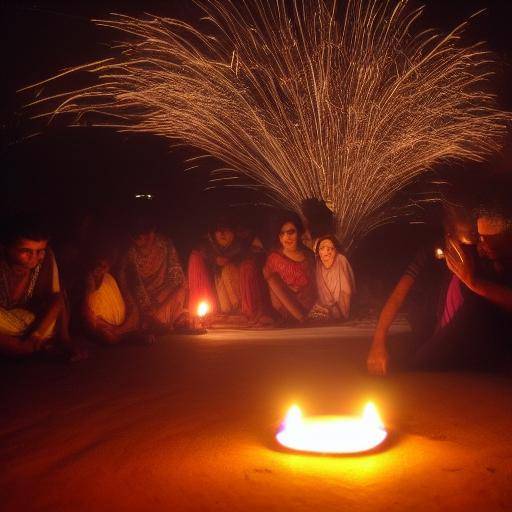
The celebration of Diwali, known as "The Festival of Lights", is one of the most significant festivities in Indian culture. This celebration commemorates the victory of good over evil, light over darkness and knowledge about ignorance. In this article, we will explore the rich tradition of Diwali, focusing on three key elements: lamps, Lakshmi goddess and fireworks. Join us on this fascinating journey through the traditions, symbolism and modern practices that make Diwali a unique celebration in the world.
Introduction
Diwali, also known as Deepavali, is a five-day celebration that culminates on the third day with the new moon night in the month of Kartik of the Hindu calendar. This festival is full of color, joy and spiritual meaning for millions of people in India and around the world. During this period, people light clay lamps known as "diyas", adorn their homes with elaborate decorations, perform religious rituals and surrender to joy and celebration.
Diwali History and Background
Diwali's history dates back thousands of years and is rooted in various legends and traditions. According to the Ramayana epic, the return of Lord Rama to Ayodhya after fourteen years of exile in the jungle marked the beginning of this festival. The citizens of Ayodhya illuminated the way to welcome their beloved prince, symbolizing the victory of good over evil and the elimination of darkness with light.
Over the centuries, Diwali has evolved and enriched with different traditions and meanings in the various regions of India. From the worship of the goddess Lakshmi, the goddess of wealth and prosperity, to the connection with trade and industry, Diwali's history is a testament to India's rich cultural diversity.
Analysis in Deep Lamps in Diwali
The lamps, or "diyas", are of central importance in the celebration of Diwali. These small clay oil lamps, lit with a wick, symbolize the spiritual illumination that dispels darkness and provides peace and prosperity. In addition to its spiritual meaning, Diwali lamps also have a deep link with art and crafts, as they are crafted with clay and decorated with vibrant colors.
The lamps not only illuminate homes during Diwali, but also illuminate people's hearts, fostering goodness, compassion and hope in a better future. The tradition of lighting lamps during Diwali is a reminder of the importance of light in our lives and its ability to dispel darkness.
Lakshmi Deep Analysis in Diwali
On Diwali's main day, Goddess Lakshmi is worshiped in recognition of her role as the divinity of wealth and prosperity. It is believed that the desire of the goddess Lakshmi to reside in a place where there is cleansing, love, peace and harmony drives people to meticulously cleanse their homes before Diwali and decorate them with flowers and colored dust designs, known as "rangoli".
The worship of the goddess Lakshmi during Diwali also has an economic and social significance, as it represents the pursuit of prosperity and gratitude for the resources granted. Diwali's festivities are often accompanied by gift exchanges, especially gold objects and jewels, symbolizing the desire for abundance and good fortune for the year ahead.
Analysis in Depth of Artificial Fires in Diwali
Fireworks have been an integral part of Diwali celebrations for centuries. The practice of lighting fireworks is considered a symbol of joy and celebration, as well as an expression of victory over darkness and negativity. However, in modern times, excessive use of fireworks has raised concerns about air pollution and the impact on the environment.
Comparative Analysis of Lamps, Lakshmi and Artificial Fires in Diwali
Comparatively, the lamps, the goddess Lakshmi and the fireworks represent different aspects of Diwali's festive, each with its own symbolism and meaning. While lamps reflect the spiritual pursuit of light, Lakshmi personifies material prosperity, and fireworks represent the euphoria and joy associated with the festive.
Although each has its unique importance, together they form a holistic synthesis of the different facets of Diwali, creating a festive experience that encompasses the spiritual, the material and the emotional.
Tips and Suggested Actions
If you are preparing to celebrate Diwali, here are some practical tips to make your experience more meaningful and respectful:
- Light your home with oil lamps: Instead of opting for electric lights, consider using traditional oil lamps to give authentic touch to your decoration.
- Honor to Lakshmi with devotion: Dedicates time to perform rituals that pay homage to the goddess of prosperity and wealth, expressing gratitude and seeking his blessing for the coming year.
- Sustainable fireworks: If you plan to light fireworks, opt for more sustainable and less environmentally damaging options.
Reflections on the Future of Diwali
As Diwali continues to evolve in a changing world, it is crucial to consider preserving the fundamental traditions and values of this holiday while adapting to contemporary needs and concerns. Sustainability, security and respect for the environment are increasingly important issues in the context of Diwali, and are expected to influence the way in which the festive is celebrated in the future.
Conclusion
Diwali, with its bright lamps, the worship of the goddess Lakshmi and the spectacular fireworks, is a celebration rich in meaning and symbolism. Beyond being a mere festival of lights, Diwali represents the victory of good over evil, hope over despair and unity over division. May this celebration inspire us to seek inner light and to radiate goodness and positivity in our lives and in the world around us.
Frequently asked questions
What is the spiritual meaning of lamps in Diwali?
The lamps, or "diyas", symbolize the spiritual enlightenment that dispels the darkness and provides peace and prosperity. Understanding them during Diwali represents the search for inner light and triumph over ignorance.
Why does the goddess Lakshmi worship during Diwali?
The worship of the goddess Lakshmi during Diwali is a recognition of her role as the divinity of wealth and prosperity. His blessing is sought for the coming year and gratitude is expressed for the resources granted.
What is the symbolism of fireworks in Diwali?
The fireworks are a symbol of joy and celebration, as well as an expression of victory over darkness and negativity. However, their excessive use has generated environmental concerns in modern times.
How can Diwali be celebrated more sustainablely?
Opting for traditional oil lamps instead of electric lights, practicing a respectful worship of Lakshmi and choosing more sustainable fireworks options are some ways to celebrate Diwali in a more sustainable way.
What is the importance of Diwali in Indian culture?
Diwali is a very important holiday in Indian culture, as it symbolizes values such as the victory of good over evil, prosperity, unity and hope. In addition, it is a crucial time to reunite family and friends.
How has Diwali evolved over time?
Throughout the centuries, Diwali has evolved incorporating different traditions and adapting to cultural and social changes. In addition, it has become more aware of sustainability and respect for the environment today.
What are some modern practices related to Diwali?
Modern practices related to Diwali include the use of innovative decorations, community events, the adoption of sustainable technologies and the promotion of social responsibility during celebrations.
With this article, readers will enjoy a deep dive in Diwali's rich tradition, while obtaining valuable information about lamps, Lakshmi and fireworks, all presented in an attractive, informative and optimized format for search engines.

